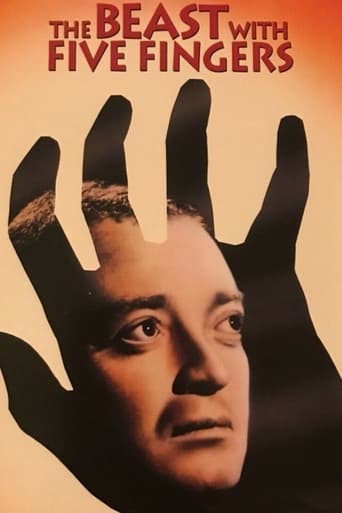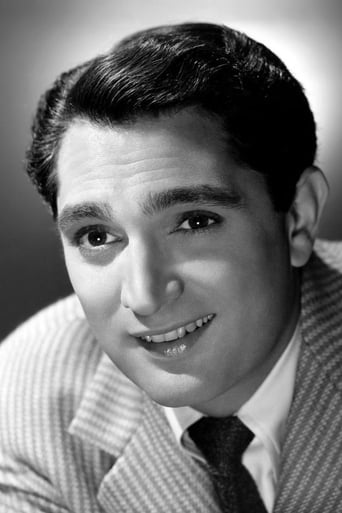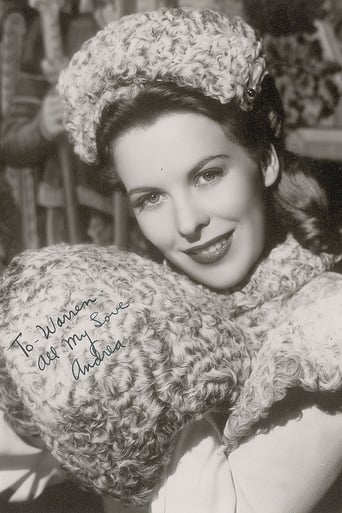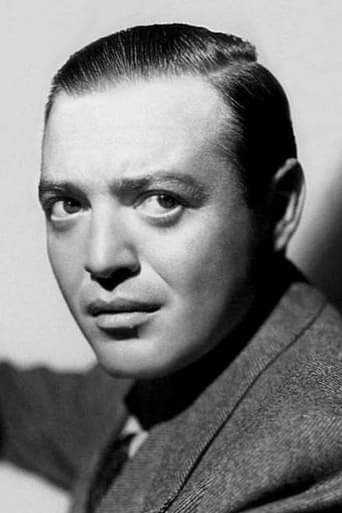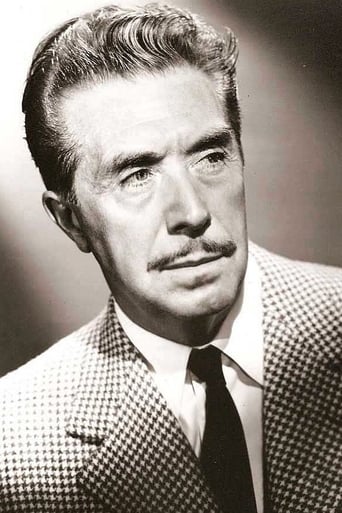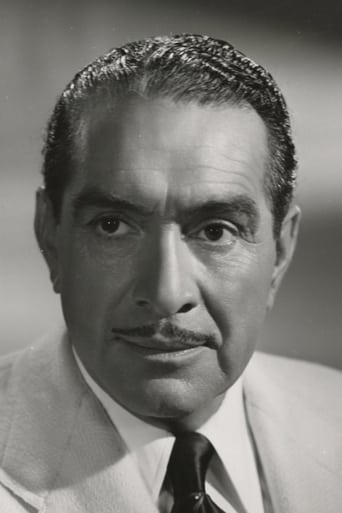Protraph
Lack of good storyline.
SpecialsTarget
Disturbing yet enthralling
Baseshment
I like movies that are aware of what they are selling... without [any] greater aspirations than to make people laugh and that's it.
Gary
The movie's not perfect, but it sticks the landing of its message. It was engaging - thrilling at times - and I personally thought it was a great time.
davidcarniglia
A very entertaining and spooky murder mystery. Peter Lorre is at his best as moony-eyed, nutjob astrologer secretary to the cadaverous Victor Francen's Ingram. The mansion, with all its medieval flourishes, exudes character. A fine supporting cast; although I found Andrea King's Julie a bit wooden. Playing opposite so many guys, she adds little, except perhaps in her last scene with Lorre. As many have pointed out, after a long lead-up, the pace picks up steam after Ingram's death. His severed hand becomes a character, as a sort of ghost/delusion.We are left with a fairly logical explanation of the apparent supernatural stuff: Lorre, not quite all there initially, goes over the verge of sanity. Cleverly, his delusion of the hand's 'revenge' is an outgrowth of his own plot to scare off and eliminate those who would toss him and his books aside. Robert Alda's Conrad is an interesting character too. He's sympathetic, yet hardly above-board. He has even less claim on Ingram's estate than Lorre/Hilary, but also much to lose. Of course marrying Julie represents his trump card. His outsider quality gives us a window, so to speak, to the goings-on at the mansion. Like the Commassario, he functions as both a witness and a participant.I'd like to have seen more exposition of Lorre's relationship to Francen. It might've been more interesting if Francen/Ingram shared Lorre's fascination with the New-Agey stuff. That could've enhanced the supernatural explanation of subsequent events. At a more basic level, it's hard to see why the hand goes after Lorre, whether it's appearing of its own volition or not. When he was alive Ingram tried to kill Hilary; if anything, it should then be Hilary who goes after him. Hilary does try to 'kill' the hand, but only after it has gone on a 'murder' rampage. Maybe there's too many supporting characters to allow for fleshing out the principals with more scenes.I usually don't like campy stuff tacked onto a dark atmosphere, but it works here. The Commassario seems to go out of his way to drop a hint, with his final enigmatic laugh at the audience, that there's yet more to the story. His dropped glove surely is just a tease, but how is it that Ingram's ring is on his finger now?Even with a few false steps, The Beast With Five Fingers is an engaging experience.
bkoganbing
It's the summer of 1900 in Italy where crippled and retired concert pianist Victor Francen has a villa. Taking care of him is nurse Andrea King and hanging around is American tourist type Robert Alda, a guy who lives by his wits and is no better than he ought to be. Police inspector J. Carrol Naish bemusedly indulges Alda's penchant for fleecing tourists.Francen dies and his will causes consternation as everything is left to King. That's not good enough for Charles Dingle who married Francen's sister and Francen's closest blood relative John Alvin. But the guy who really goes off the deep end is Francen's secretary and companion Peter Lorre. There's a bit of a hint here that these two might have been an item. It would explain why Lorre is more than upset with being put out. There sure is a nice gay subtext to this plot.Soon afterward there's some one handed piano playing going on which Lorre hears and at least one murder. Francen's fingerprints are found in all kinds of interesting places after he died.The story could have used a bit of tightening up, but Lorre really carries the day playing his usual madman. This was Lorre's last Warner Brothers film and it certainly is his show.Could have been better though.
jwyoder
"The Beast With Five Fingers" is a 1946 Gothic horror film set in a large villa near an Italian village. Soon after pianist Francis Ingram's death, a series of mysterious events haunt his friends and relatives as they fight for control over the estate. Ingram's piano suddenly plays music in the middle of the night. A mysterious light glows in Ingram's mausoleum. Ingram's attorney is choked to death. Evidence points to Ingram's disembodied hand as the culprit.The standout performance in the film is by Peter Lorre, who plays a man driven to insanity. Lorre's character Hilary Cummins is the center of a big reveal roughly halfway through the movie that's wonderfully creepy and bizarre. "The Beast With Five Fingers" has the most energy and life whenever Lorre is at the center. The film lags, however, whenever it turns to the subplots of the the other characters. Lorre shines amidst all that flat, wooden acting.My biggest issue with "The Beast With Five Fingers" occurs when the film abruptly ends and takes a jokey, humorous tone that undermines the suspense of the rest of the movie. One of the characters suddenly turns to the camera, addresses the audience and laughs at how unbelievable the events of the film are. I don't understand the point here – the quick explanation in the final reveal feels unearned and the unexpected break with the fourth wall feels bizarre. Despite these issues, "The Beast With Five Fingers is worth seeing for Lorre's performance and its creepy, Gothic atmosphere.
Lee Eisenberg
Who better to star in a sinister story like "The Beast with Five Fingers" than bug-eyed, raspy-voiced Peter Lorre? The movie depicts an Italian town where a string of murders is attributed to a severed hand. Yeah, kinda silly, but it's still a very enjoyable movie. Oliver Stone remade it as "The Hand", starring Michael Caine as a cartoonist whose hand gets chopped off but doesn't stay dead (this was early in Stone's career, so the movie has nothing political).So, this one is just some good old-fashioned Gothic horror, including a trick at the end. A fine achievement for Lorre, along with Robert Alda, Andrea King, Victor Francen and J. Carroll Naish.
